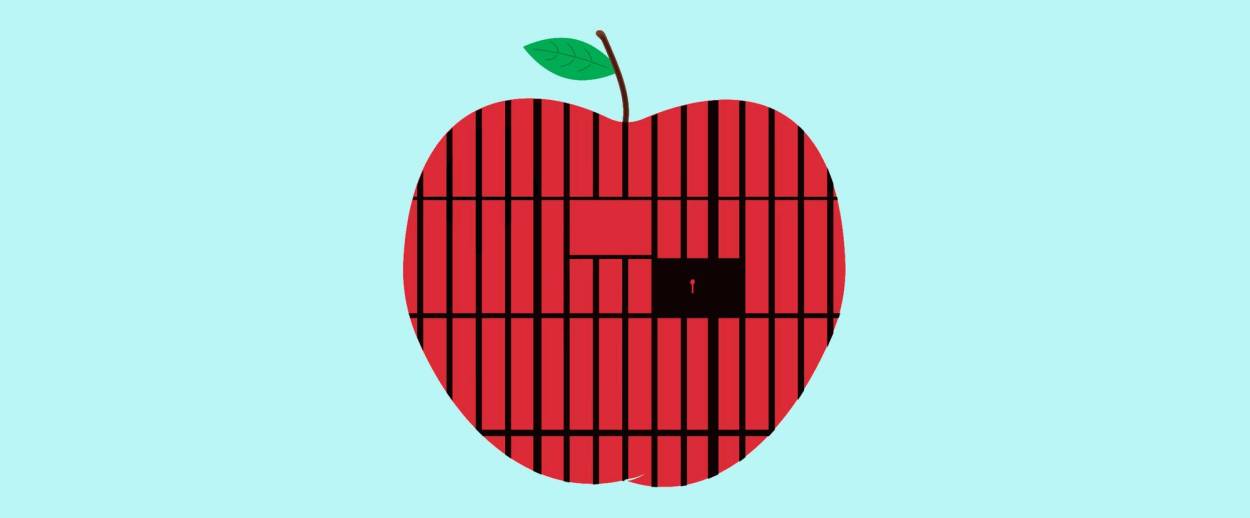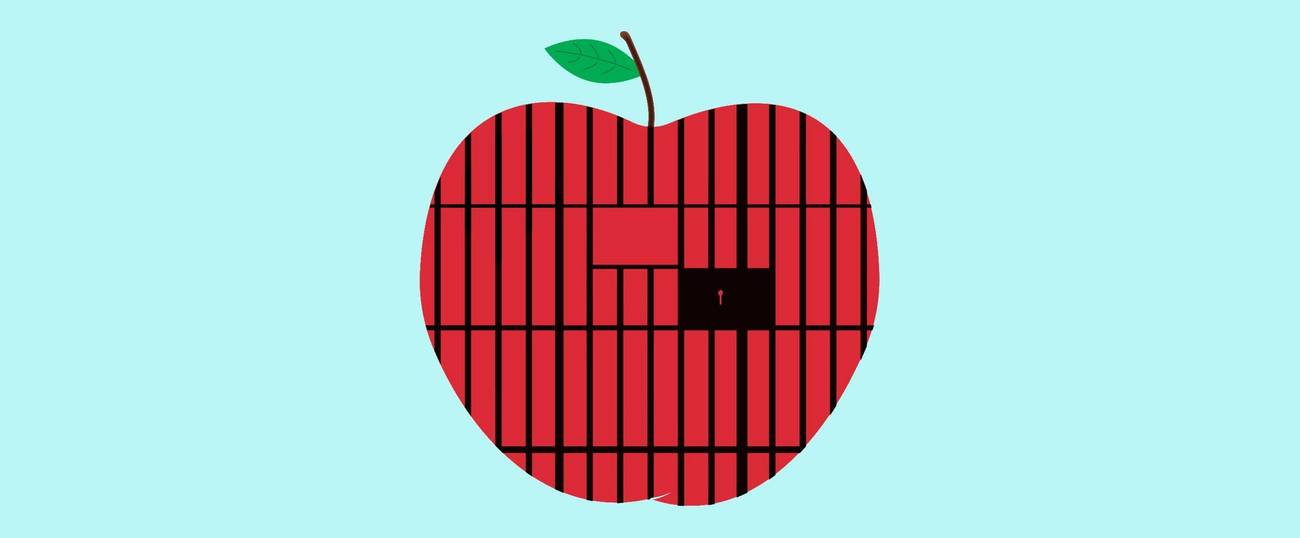Rosh Hashanah Behind Bars
What I learned leading High Holiday services at Rikers Island




I awoke to the now familiar smell of a hard green pillow, its fire-resistant plastic pressed against my face. Nearby my friend lay on his cot several inches off the floor saying modeh ani, the prayer of gratitude recited daily upon waking. Outside our room a correctional officer—definitely don’t refer to him as a prison guard—stared at his desk, slowly collecting overtime until the end of his 16-hour weekend shift.
My friend and I were here to lead Rosh Hashanah services for the Jewish residents of Rikers Island, the overcrowded New York City jail complex notorious for its violence. Due to religious prohibitions on traveling during the festival, we stayed on the island for three nights in a room generally used for educational programming. Morning services would be starting in about an hour, and like any other morning, it was time to brush our teeth, get dressed, and shake off lingering grogginess.
The ordinariness of the moment starkly contrasted with the anxiety I had felt the day before, as I drove to Rikers, a vast complex surrounded by tall barbed wire fences and armed guards. Unsure of whether I’d be able to connect with the participants and concerned I’d say the wrong thing, I questioned whether I was really here to serve as a chaplain or to indulge my curiosity about society’s margins. We were led past a wall of shelves filled with riot gear to the gym, where services were held, and began. Around 40 men and 10 women sat on plastic chairs wearing colored jumpsuits signifying their particular jail, while two dozen officers with bored expressions watched inattentively from bleachers.
The unique circumstances added layers of meaning to a liturgy otherwise prone to staleness. Ears perked up at matir asurim—a blessing of gratitude to God for freeing those in bondage—during the long list of morning blessings. I had overlooked its meaning thousands of times while praying within synagogues and yeshivas as just another blessing to speed through. Here, it represented hope. It mattered.
A festival meal followed services, with food slightly less terrible than Rikers’ regular fare. The Rosh Hashanah tradition of dipping an apple into honey was the clear highlight of the meal, a rare taste of sweetness in the jail complex. With caps discarded, honey gushed freely from plastic bears, and together we recited the symbolic blessing wishing us all a sweet year.
During the meals I alternated from table to table, thanking each individual for their participation and getting to know as many people as possible. The greatest surprise of these moments was how simple it was to hold a conversation. Small talk was sacred and sought after. In jail, a context in which everyone one encounters on a daily basis is either forced or paid to be present, I learned ordinary chitchat can go a long way in affirming one’s human dignity.
It was also not uncommon for requests to arise during a conversation: to help get someone on the kosher meal list, or the glatt kosher meal list, for a yarmulke or a tallit or a Bible, or for vegan soap. Perceived as someone with authority vis-a-vis the correctional officers, many people were hoping I could make their lives a little easier. There was little I could do to follow up on most of these requests; yet the simple act of listening to people who are often invisible and validating their concerns felt significant irrespective of anything else.
But a stern-looking man in his early 30s—to protect his privacy, I’ll call him Jacob—struck me in particular. Everything about the way he presented himself seemed genuine, self-disciplined, driven, and generous. He followed along closely during services, calmly answering the questions we posed to the audience and responding with questions of his own. I distinctly remember one question he asked me in private. Rosh Hashanah would end on a Friday evening just as Shabbat was beginning, and he was unsure how that affected the havdala blessings that mark the distinction between sacred time and mundane time. We had met for afternoon services that Friday, and Jacob wanted to know which havdala he should make later that evening. In a setting where manipulation felt ubiquitous, it seemed the type of question that could only emerge from genuine concern.
On Saturday evening we left the jail complex after a long three days. Eager to learn more about Jacob’s situation, I looked him up in the Department of Corrections inmate database. He had been charged with a violent felony, with the potential of many years in prison. He had already spent more than a year at Rikers and his trial had not even begun. I was shocked. I Googled Jacob’s name and learned that someone with the same name and a similar age had risked his life by jumping onto subway tracks a few years prior in order to save a drunk man who had fallen. Like much at Rikers Island, little seemed to add up, but there wasn’t time to dwell. The following day, I arrived in Chicago to begin divinity school.
Several months later, I visited New York for a long weekend and had time to spare after walking off the A train at Penn Station. Typically, I find walking in this frenetic and overcrowded part of the city alienating and unpleasant. I happened to notice a man crossing the street ahead of me with a big yarmulke and the fringes of his tzitzit untucked. I knew that I recognized him, but couldn’t place him. There were several people between us and his face was obscured. As I began to quicken my pace to walk behind him, it dawned on me who he was. I followed him around the corner, where there was a police officer on the ground helping a person who seemed to have fallen out of their wheelchair. Jacob sprang into action and helped the officer lift the individual. The officer thanked him profusely. At this point his identity was unmistakable and I reintroduced myself.
Jacob recognized me immediately, breaking into a big smile before giving me an update. He had been out of jail for three weeks after being held on Rikers Island for 20 months. He had taken his case to trial and won. As Jacob spoke to me, his eyes shone with a brightness unlike anything one sees in Rikers Island, and he was overjoyed that we had the chance to speak as free individuals. He was living in a shelter, looking for work, and spent free time learning Hebrew from a workbook. Reflecting with a smile, Jacob commented how God had put him in the right place at the right time to help the individual who had fallen, and how it made him think of a time years ago when he had jumped onto the subway tracks.
Before serving in a spiritual role within jails, I had already been engaged with the politics of criminal justice reform and mass incarceration for years. I could recite jarring statistics—more than 2 million incarcerated in the United States, encompassing one-fourth of the planet’s prisoners—off the top of my head; I followed updates on pieces of relevant legislation up for discussion rigorously. Yet it was only through face-to-face interactions with those trapped behind bars that the urgency of these reforms truly sank in. At the core of Jewish tradition is the imperative “you shall be holy” (kedoshim tihyu)—just as God is compassionate and merciful, so too must human beings be compassionate and merciful. On Rikers Island, I learned that this imperative is not only about pursuing justice from spaces of comfort, but that holiness entails placing oneself in the presence of those in need and encountering the divinity within them. Serving in a jail made me realize that I had not truly appreciated the stakes of these discussions until I formed personal relationships with those directly impacted. Reflecting back on all the individuals at Rosh Hashanah services who would not beat their cases, I prayed that the sweetness of the honey would nevertheless find a way to permeate their lives.
Yitzhak Bronstein is a master’s student at the University of Chicago Divinity School and a regional Jewish educator for Moishe House.